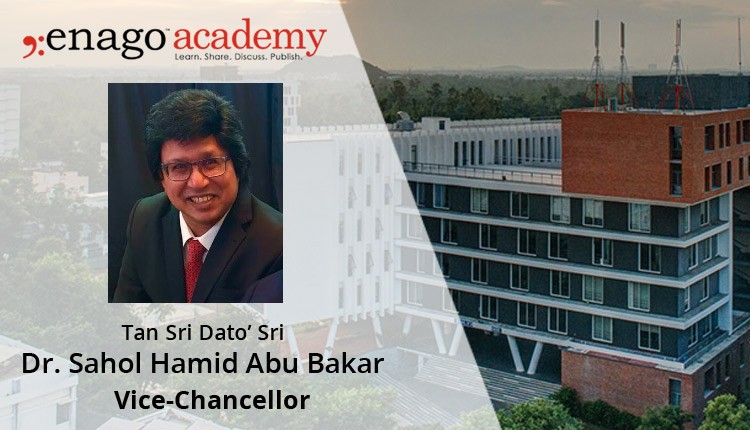University Administrators & Scientific Research: An Interview With a Distinguished Vice-Chancellor

Enago Academy recently interviewed the Vice-Chancellor of B. S. Abdur Rahman Crescent University, Tan Sri Dato’ Sri Dr. Sahol Hamid Abu Bakar, a Malaysian national and a distinguished leader with several international recognitions to his credit. Over the years, he has gained extensive insights on academic policies related to research and publishing. The BSARCU VC recently received honorary doctorates from the renowned University of Sussex, UK, and University of Stuttgart, Germany. He has also received recognition from the Malaysian government on several occasions and has worked with the Ministry of Education, Govt. of Malaysia. The following is the transcript of the interview:
Universities across the globe, especially those in Asia, need to launch major initiatives for promoting meaningful and high-impact research. What are your top recommendations for Asian research universities?
A lot of funded research projects are being carried out in Asian countries, yet something seems to be clearly lacking. In order to pursue more meaningful research, faculty and students need encouragement. People often look for job opportunities with substantial pay. Research does not seem like a lucrative career option to today’s youth. However, that is not true at all. One can carve a niche and convert research into a lucrative career option. For that to happen, the governments and thought leaders in Asian countries need to set aside a pre-determined budget for research facilitation. Government and private funding agencies also need to join hands for promoting research.
High-quality and truly promising research initiatives need to be identified. Scientists, engineers, and biomedical researchers conducting high-impact research need support through financial aid and infrastructural upgrades. When identifying such projects, the prime focus should only be on the quality of work. No other element should play a role here—favoritism, politics, prejudices, to name a few. Another important factor to consider would be the gap between academic research and industry requirements. Industries have their own research teams and they work on confidential projects. Unlike academic research (i.e. published in journals and made available to the general public), industry research has a more closed-door approach. This widens the gap further, because only a few research results have practical implications, whereas the rest end up as theses on library shelves.
Please share with us, your views on research-inspired entrepreneurship. What steps should researchers undertake to become successful entrepreneurs?
Research and entrepreneurship are two critical areas. Generally speaking, a researcher would look forward to receiving good financial assistance to carry out his/her proposed research work. If it becomes available through the industry, then researchers would very easily be able to continue with their plans, without worrying too much about the financial aspects. An entrepreneur would also be vying for funds; but only if he/she could prove that his/her product would be successful in the market. This is a challenge every researcher-cum-entrepreneur must face.
When talking about research, people always tend to think about devising complex solutions to critical issues. However, that need not be the case all the time. We need to think hard and find simple solutions even to tiny problems. Researchers need to become aware of the fact that even tiny but meaningful entrepreneurial solutions to research problems can become successful.
In our Institution—B.S. Abdur Rahman Crescent Institute of Science & Technology, we have an incubator cell through which we motivate our students to come up with innovative ideas and then transform those into products. We help them patent the process or product and also help them in marketing their innovations. In addition, we provide funding for smaller projects and enable them to get funding from other agencies. In fact, we have a dedicated full-time team for this cause. We even encourage students to launch at least one start-up every year. Our students receive excellent mentorship from our diligent faculty members.
Enago Academy hosts a knowledge platform with over 1,000 resourceful posts for researchers (enago.com/academy). We also conduct workshops, webinars, and LIVE video consultations for researchers from around the world. What would be your advice to university administrators who wish to ensure their faculty, technical staff, Ph.D. students, and postdocs use the above resources for facilitating research and high-impact publishing?
I am glad to say that our institute also encourages all of its students, faculty members, and research scholars to participate in massive open online courses (MOOCs). Apart from this, students and faculty members can also attend important webinars and live video consultation sessions. We also encourage our students, researchers, and faculty members to enrich their knowledge by using technological advancements.
You have been associated with various high-profile advisory boards. What were the most important research-related initiatives you undertook as an experienced advisor? On a related note, what important changes did you bring in?
Universities (government or deemed) and higher education institutes need to aggressively promote research. I have devised target indicators for all the departments and schools of my institute. One of the identified targets is to file for patents and convert patented innovations into marketable products. Our faculty members are also encouraged to publish in high-impact-factor journals. However, in order to publish in these journals, researchers need to work on truly novel research proposals. Derivative work cannot act as a substitute. I firmly believe that even a single publication in a high-impact-factor journal can boost the morale of faculty members and motivate them to continue pursuing research with greater zeal. It has been our policy to reward successful researchers with incentives and other benefits.
You are extremely popular in Malaysia and you have been invited by reputed Western Universities to offer advice and consultation on various topics. Please share with us, a few notable experiences.
Having served academia for over 40 years (in Malaysia and abroad), I have now honed my sixth sense in managing people. Problems are everywhere and I like to solve them using the foresight that I have gained through my extensive experience in academic administration. My knowledge of university administration comes in handy when I adopt best practices from around the world. I especially love challenges and it is indeed exciting to move a university up in the rankings and ratings game. I have made this possible in the universities that I have been a part of.
What are your views on leadership? How should university vice-chancellors and administrators ensure that their faculty members and students transform into world-class leaders?
I chose to be a leader to represent the masses; yet, at the same time, I set myself apart by embracing qualities deemed fit for a leader—integrity, transparency, decisiveness, delegation, and accountability. In fact, I would suggest that we follow “blue ocean leadership,” which, I have found to be highly effective. A leader should not only focus on ideas and ideologies, but also convert those into actions.
A vice chancellor or any other administrator in a university/institution must not sit in an office surrounded by four walls. He/she should constantly get in touch with all the institutional stakeholders. A leader must also have exemplary vision. I am proud to say that I follow an “open-door policy” in my institute. Nowhere can you find a vice-chancellor who would sit and chat with students. Our students, parents, and staff members can meet me on any day, at any time, and without any prior appointment. I make it a point to interact with them on a regular basis. In addition, I also insist that other administrators in my institute follow the same so that it helps in the smooth implementation of academic and administrative processes.
Furthermore, I organize “Town Hall Talks” for my students, research scholars, and faculty members and try to learn more about their problems. This helps us identify unique solutions to existing problems. I also share a direct email address through which any institutional stakeholder is able to send his/her queries, highlight issues, and offer suggestions. I personally respond to all such emails. This is how I establish and maintain rapport with my people and I feel that others should also follow a similar protocol. A little bit of personal touch is always required for someone who aspires to be a good leader. You cannot put yourself on a high pedestal and expect great outcomes.
What would be your advice to Ph.D. students and early-stage researchers from Asia?
Research scholars must show tremendous passion when pursuing research. They should not do it out of compulsion. Unlike in the West, students in Asian countries become compelled to pursue research. Research is now done under compulsion, primarily because Ph.D. degrees have been mandated for the jobs of lecturers in institutes of higher education. If it is forced upon someone, the quality of the work almost certainly suffers. That is precisely why we do not see great outcomes from many of our Ph.D. degree holders.
A quick fix would be to permit Ph.D. registration only after the aspiring doctoral candidate successfully publishes his/her work in a legitimate journal. This could help the researcher to have clarity about the research work undertaken and proceed with deeper and more meaningful insights. Pursuing a Ph.D. requires great perseverance and dedication. Of course, I agree that there will be hitches and hindrances during a PhD course. However, dedication, devotion, and perseverance can help overcome this.
It was a great pleasure to talk to Tan Sri Dato’ Sri Dr. Sahol Hamid Abu Bakar. We sincerely thank him for taking the time to be a part of this interview and also wish him the very best in his future endeavors!
(This interview is a part of our interview series on Connecting Distinguished University Administrators and Researchers.)





